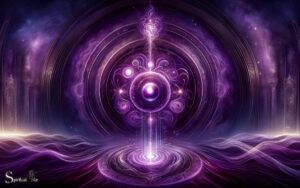What Does the Number 13 Symbolize Spiritually? Rebirth!
The number 13 is often seen as a symbol of transformation, rebirth, and renewal in various spiritual traditions.
Despite its reputation for bad luck in some cultures, it is also associated with positive attributes such as unity and femininity in others.
The spiritual significance of the number 13 can provide profound insights into personal and collective consciousness.
Spiritually, the number 13 has been both revered and feared throughout history. In many ancient cultures, it represented a powerful symbol associated with gods and goddesses.
For example, the Aztecs believed the number 13 was sacred as it represented the number of time periods. Conversely, Western superstitions often view 13 as unlucky, particularly in the context of Friday the 13th.
However, in numerology, 13 is reduced to the number 4 (1+3), which symbolizes stability and grounding, further indicating its complex symbolism.
Positive Symbolism:
- Transformation and Change
- Feminine Power (13 lunar cycles in a year)
- Unity and Wholeness (12 apostles plus Jesus in Christianity)
Negative Symbolism:
- Unlucky or Misfortune (Western superstitions)
- Death and Rebirth (Tarot card XIII)
Embracing the duality of the number 13 can lead to spiritual enlightenment and the realization that endings are often the precursors to new beginnings.
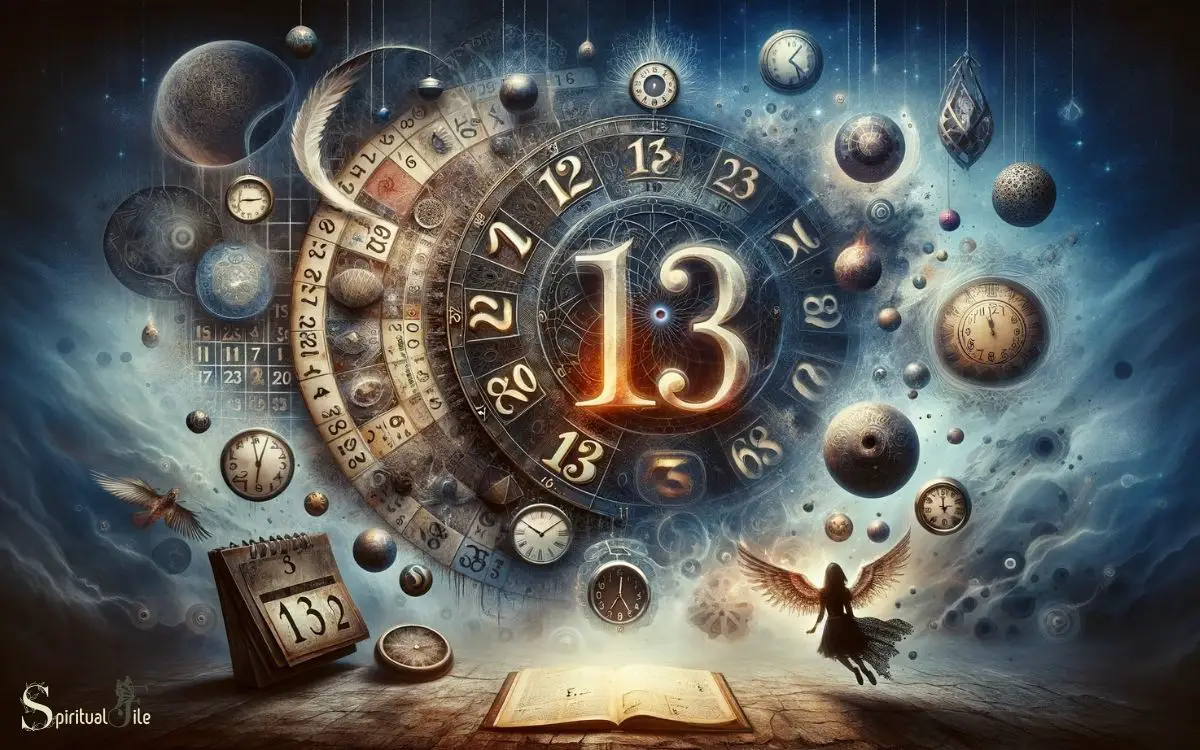
Key Takeaway
Origins of the Number 13
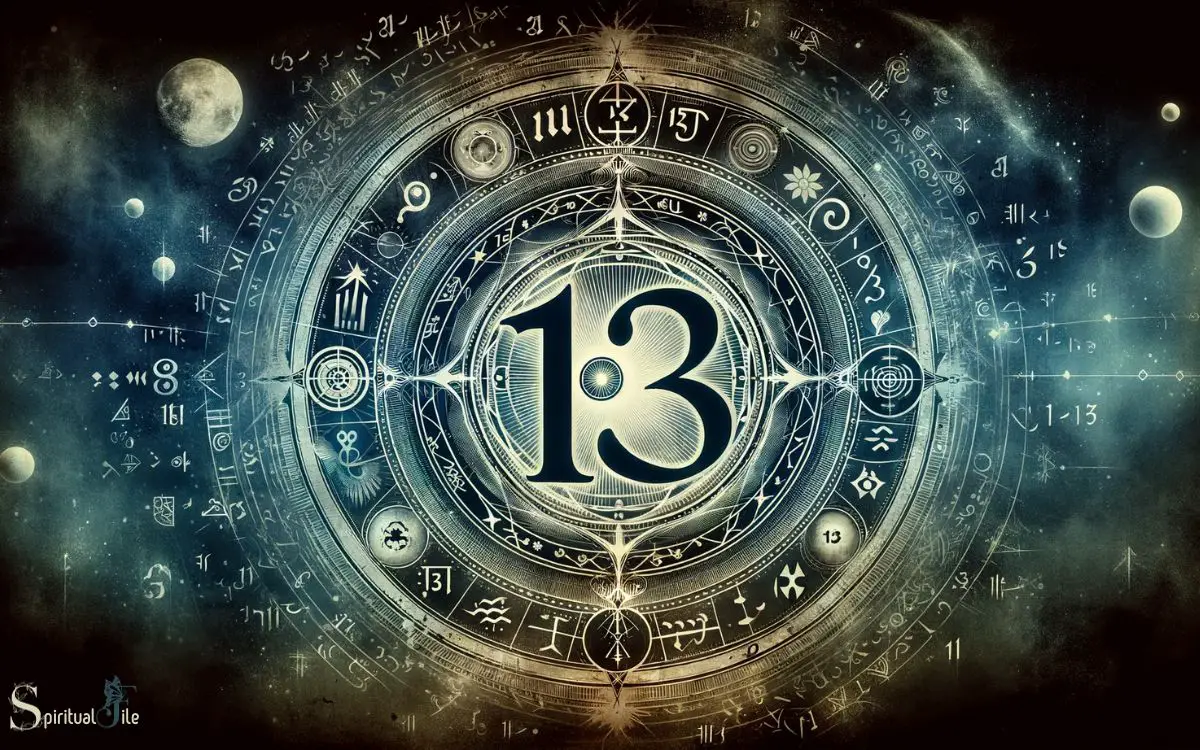
The origins of the number 13 can be traced back to ancient civilizations and their cultural, religious, and mathematical significance.
In many ancient societies, the number 12 represented completeness, as seen in the 12 months of the year, 12 zodiac signs, and 12 hours on a clock.
The addition of the number 13 disrupted this completeness, leading to its association with irregularity, rebellion, and mystery.
In religious contexts, the number 13 is often linked to significant events or individuals, such as the Last Supper in Christianity, where there were 13 individuals present.
Mathematically, 13 is a prime number, and in some cultures, it is considered a symbol of good fortune.
These diverse influences have contributed to the multifaceted symbolism of the number 13 across different cultures and belief systems.
The number 13 has been imbued with various meanings and interpretations throughout history, reflecting the cultural, religious, and mathematical significance it holds.
This influence can be observed in the diverse ways different cultures perceive and symbolize the number 13.
The Number 13 in Different Cultures
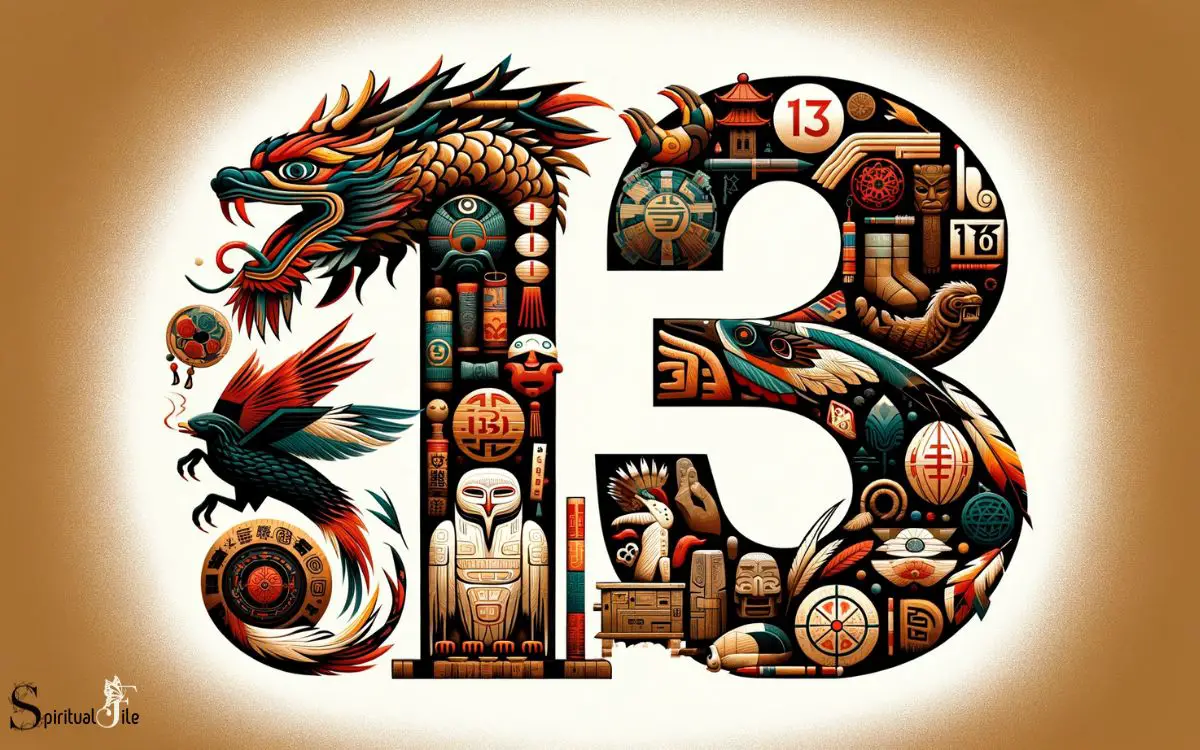
Symbolically, in various cultures, the number 13 holds diverse spiritual connotations and interpretations.
Here are some examples of how the number 13 is perceived in different cultures:
- In ancient Egypt, the 13 steps on the ladder that led to eternity were associated with the afterlife.
- The Maya civilization considered 13 to be a sacred number, representing the 13 levels of heaven.
- In Norse mythology, 12 gods were having a feast when the mischievous Loki crashed the party, resulting in the death of the beloved god Balder, making 13 an unlucky number.
- The Chinese, however, view 13 as a fortunate number associated with growth and reaching new heights.
These examples demonstrate the varying cultural significance of the number 13, highlighting the rich tapestry of spiritual beliefs and interpretations across different societies.
Symbolism of 13 in Spiritual Texts
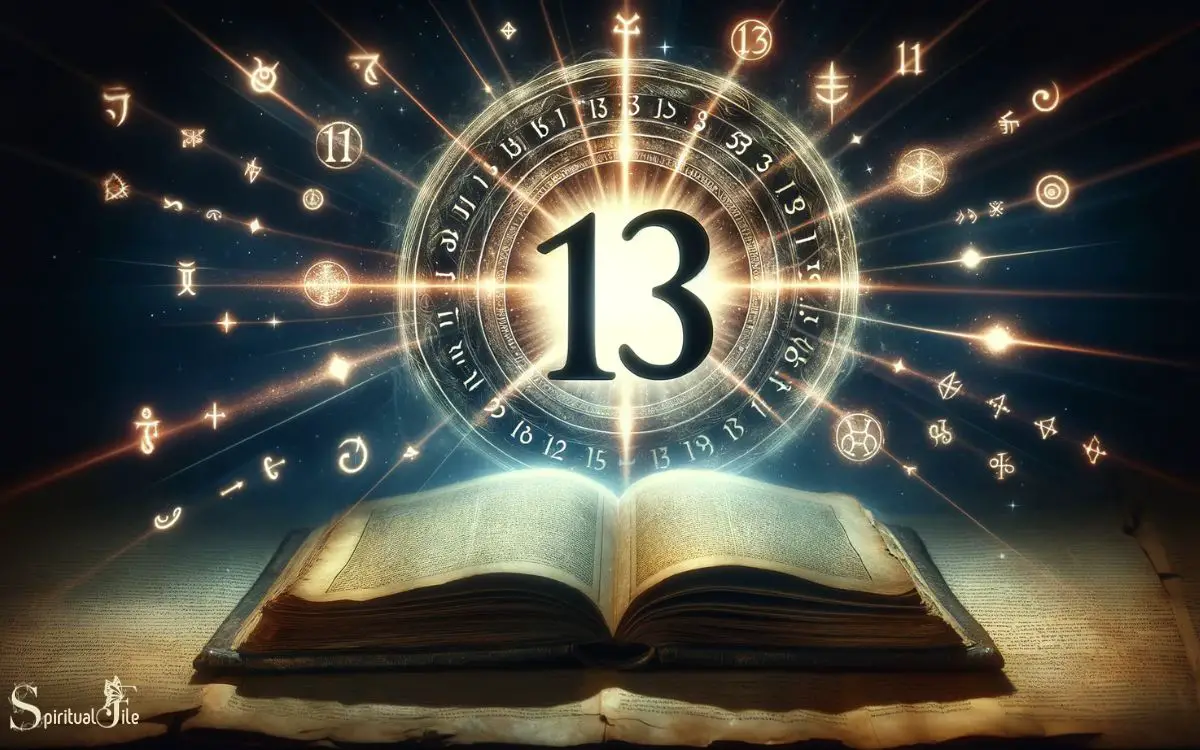
In spiritual texts, 13 is often depicted as a significant symbol representing transformation and rebirth. It is seen as a number that signifies the end of one cycle and the beginning of another.
The symbolism of 13 in spiritual texts can be found in various religious and philosophical traditions.
Below is a table that illustrates the symbolism of the number 13 in different spiritual texts:
| Spiritual Text | Symbolism of 13 |
|---|---|
| Christianity | Represents the Last Supper with Jesus and his 12 disciples, marking the transition to a new covenant. |
| Judaism | Symbolizes the age of maturity and responsibility, as a boy becomes a Bar Mitzvah at 13. |
| Hinduism | Represents the 13 lunar phases and is associated with transformation and renewal. |
The symbolism of 13 in spiritual texts emphasizes the concept of transition, growth, and the beginning of new phases. This notion sets the stage for understanding the superstitions surrounding the number 13.
Superstitions Surrounding the Number 13
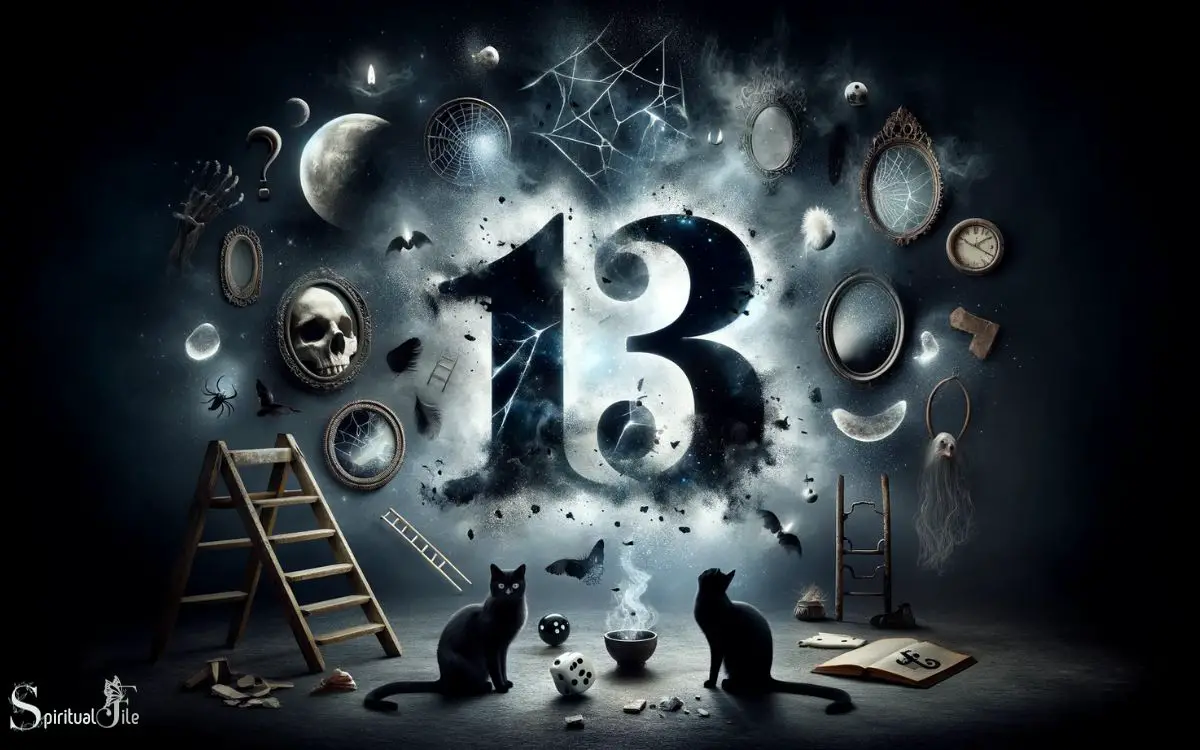
Superstitions surrounding the number 13 have been prevalent in various cultures and are often associated with bad luck or omens. This fear of the number 13 is known as triskaidekaphobia.
Some common superstitions about the number 13 include:
- Many buildings do not have a 13th floor, jumping from 12 to 14, to avoid the perceived bad luck associated with the number.
- Friday the 13th is considered an unlucky day in Western superstition and is associated with a range of negative occurrences.
- In some cultures, it is believed that if 13 people sit down to dinner together, one of them will die within the year.
- There is a superstition that breaking a mirror brings seven years of bad luck, and when the mirror is broken, it is said that the soul is trapped inside, representing the number 13.
How Does Reflection Connect to the Spiritual Symbolism of Rebirth?
Reflection plays a crucial role in the spiritual symbolism of rebirth. The process of introspection and self-examination, often associated with September, allows individuals to gain profound insights and understanding. Through reflection, one can shed old patterns and beliefs, paving the way for personal growth and transformation. This connection between September, spiritual symbolism, and reflection lays the foundation for embracing the renewal and rebirth of the soul.
Harnessing the Power of 13
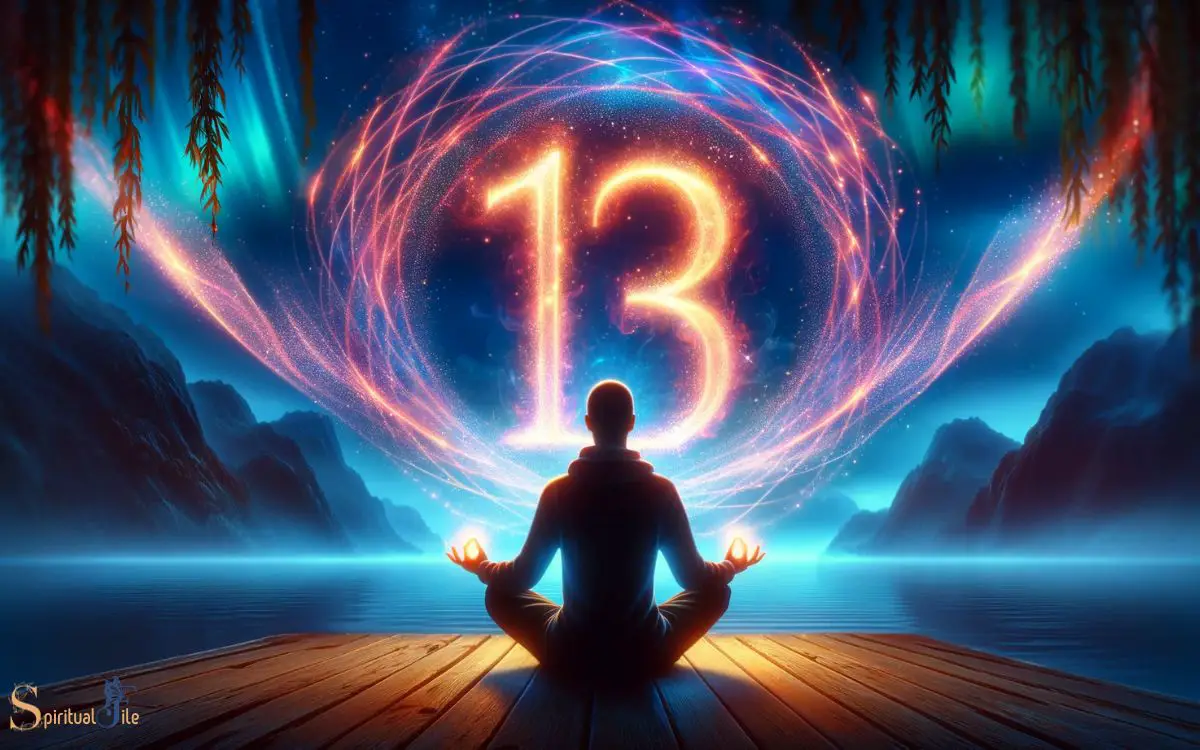
Embracing the significance of the number 13 allows individuals to tap into its spiritual energy and potential for transformation.
In various spiritual traditions, the number 13 is considered a symbol of profound change, rebirth, and spiritual growth.
Harnessing the power of 13 involves recognizing its connection to cycles, such as the lunar phases and the annual cycle of 13 full moons.
This number encourages individuals to embrace the unknown and navigate transitions with courage and resilience.
To harness the power of 13, one can engage in rituals or practices that honor this transformative energy, such as meditation, journaling, or setting intentions for personal growth.
Conclusion
The number 13 holds significant spiritual symbolism across various cultures and spiritual texts. It is often associated with mystery, transformation, and divine feminine energy.
Despite superstitions surrounding the number, many people believe in harnessing the power of 13 for spiritual growth and alignment.
As the saying goes, ‘as above, so below,’ the number 13 continues to hold spiritual significance in the collective consciousness.



